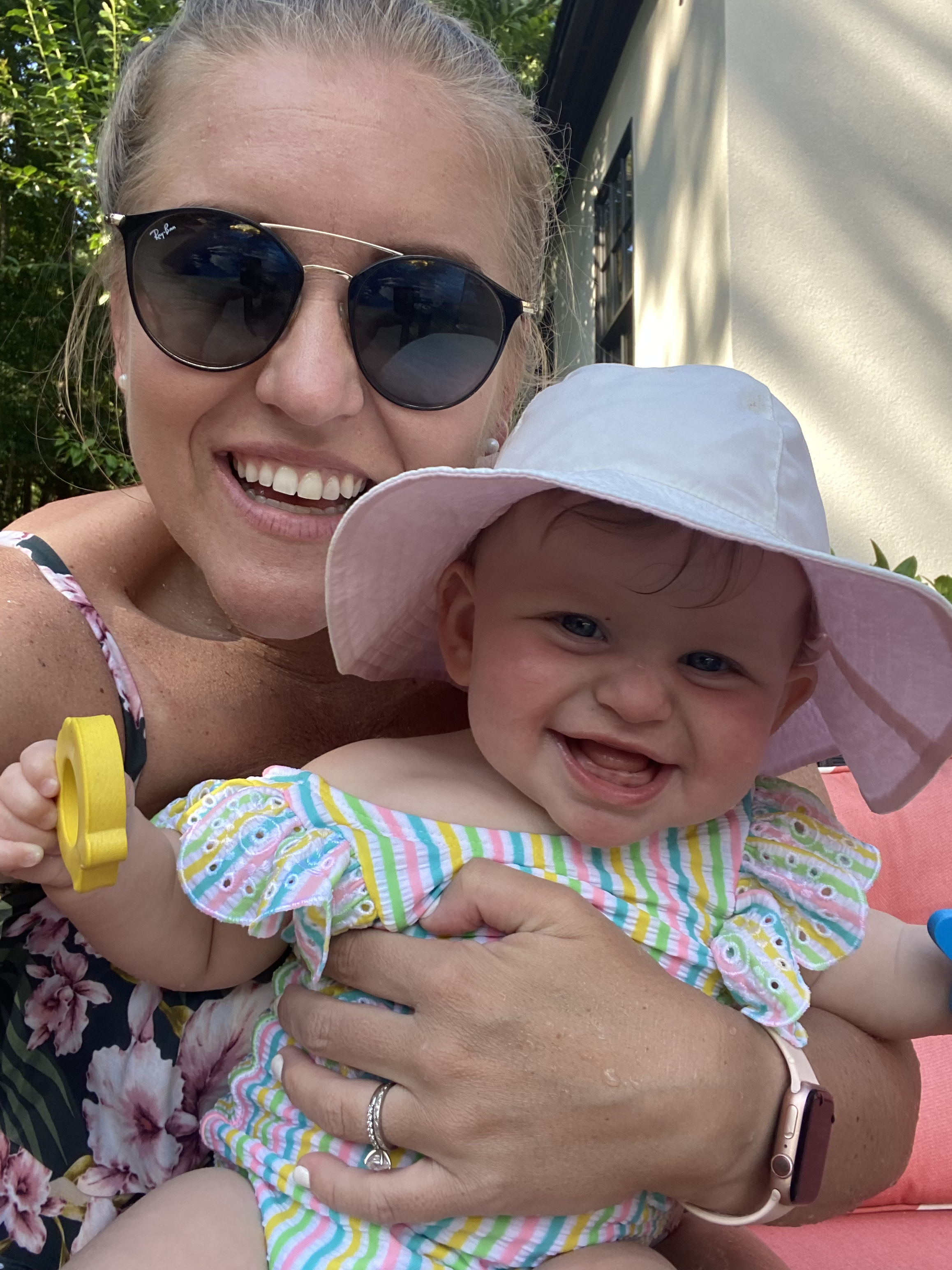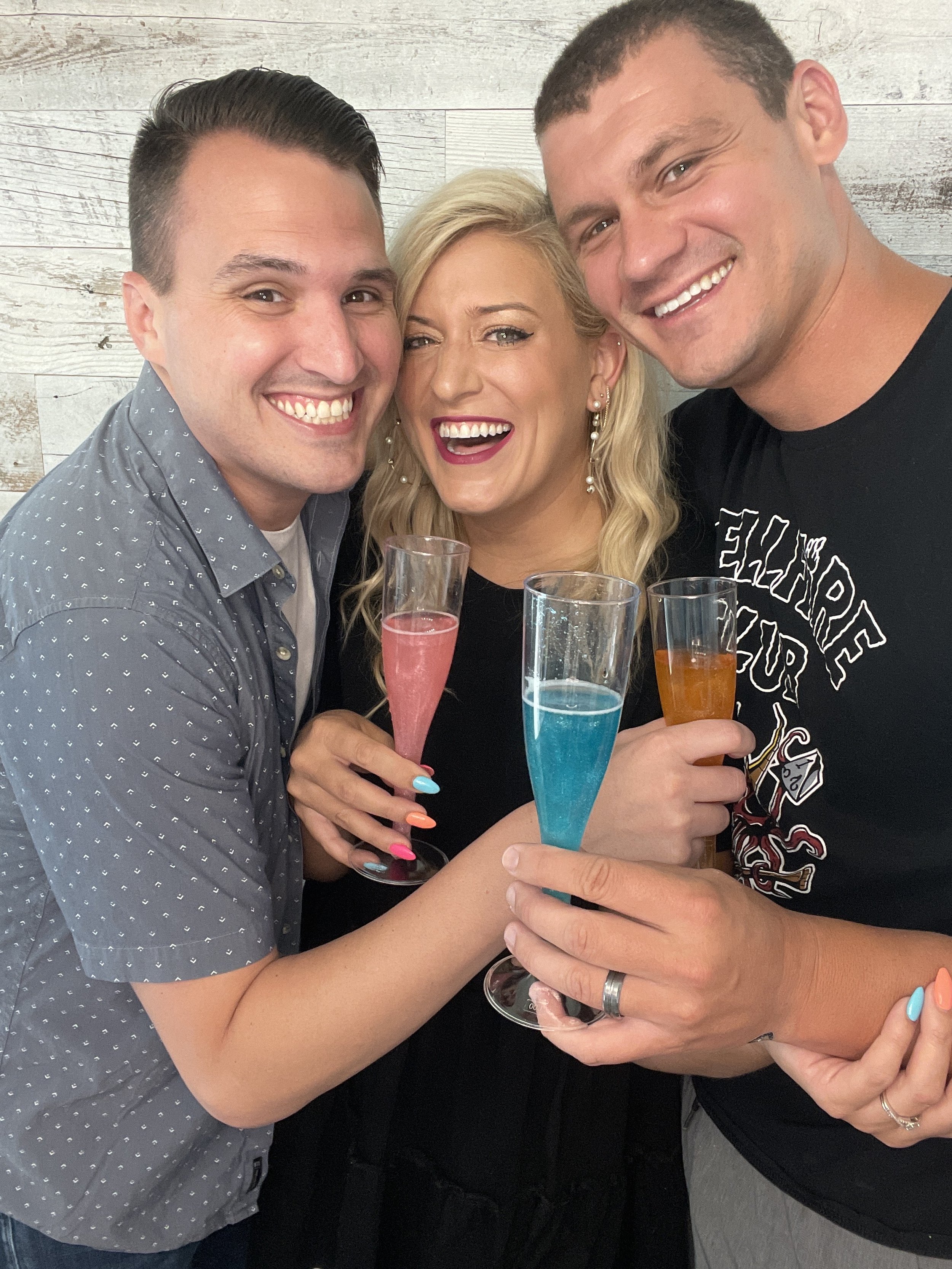Hiding in Your Room
/Singer-songwriter Molly Jenson on showing up as your real self, especially after heartbreak.
So much about being a professional artist is showing up.
Again and again and again and again. Even when it hurts.
It also requires a transmutation of rejection, seeing it in a new skin.
What a professional artist knows is that rejection is part of the job – not a sign you’re wrong for the job.
Molly Jenson gets this - she’s been a professional touring artist for almost 20 years and has written and sung with dozens of bands and famous artists, like Sean and Sara Watkins of Nickel Creek, Schuyler Fisk, Greg Laswell, and Jon Foreman of Switchfoot.
Molly is also effortlessly cool - the kind of cool you cannot even try to be (i.e. the kind of person who can pull off adult overalls and almost make you think you can too until you remember you would look like a toddler).
I first saw Molly at a concert showcase she organized to say goodbye to a closing decades-old beloved coffee house in San Diego called Lestat’s, a place one of the singer-songwriters called, “a safe place to fail.”
Molly sang her song towards the end, and the moment I heard it I knew I’d want to interview her.
Where are you off to
in such a hurry, girl?
Is something chasing you?
What has you spinning round
in circles, little girl?
is it the world or
is it you?
There’s no use trying to stop this
There’s no use trying to make it go away
Before you disappear
Just give it time
What are you hiding from?
What do you think will happen?
If you see this one through?
We met weeks later at my favorite coffee shop in Del Mar; it’s one of those instagrammable places I’m not quite cool enough for, but I go anyway. When Molly walks in, however, the place pales in comparison to her instagrammable-ness. Tall, cropped white-blonde hair, bangs, and mom-jeans that look so cool you again almost think you could pull it off too (until you realize you’d look like you were dressing up for some kind of 80’s theme party).
She sits down with a big plate of avocado toast and we start talking about how someone goes from singing in school plays to becoming a professional artist, and what she’s learned so far.
She was in every choir, play, and musical event growing up, and she’s kept that up her entire life. Molly volunteers for almost everything to do with her art. She’s always been one to say yes.
In college, a band asked her to go on the road with them. She said yes. They did 300 shows that year - in a small van. But even in those tight conditions, Molly loved it. (These tours paid, too.) She was a working professional artist, and she was hooked. This began a touring career that would span decades.
But tours don’t go on forever.
When a tour ended, she would have to figure out something else to pay rent.
A cycle began. Tour. Go home to San Diego. Work at a coffee shop. Repeat.
When one coffee shop stint became longer than expected, she got restless.
Her mom mentioned that one of their family friends, Adam Gillespie, was working for a local band - helping them with their merch. Molly’s ears perked up.
It seems the band was growing in popularity and the merchandise workload. Molly decided to ask Adam if he needed any help.
He said no, he was good, but thanks.
She went back to serving coffee.
But then, two weeks later, Adam called and said “You know what, I actually do need help.”
That’s how she began working for Switchfoot.
Adam hired her on a trial basis – she had never worked in merch before and didn’t know Photoshop, but she took the opportunity, learned quickly, and proved herself to be invaluable.
She worked with Switchfoot full-time for five years, working with them off and on when she wasn’t touring for a total of 11 years. (That led to her eventually performing with Jon Foreman, the lead singer, too.)
Not too long after a friend from college, Greg Laswell, became a producer and heard through mutual friends that Molly was starting to write songs.
He asked her if she wanted to make an album. She wasn’t sure if she could do it, but they met up and finished her first song in a day. The songs kept coming. They recorded all of them.
Molly reflects now how crazy it was to record the first songs she ever wrote. She’s been in the business long enough to know that most professional recording artists start with about 50 songs and then choose the final 10 for the album.
But there was boldness in her first album. She did it.
And something magical happened at the end of the process.
“I didn’t write any of the songs by myself – I wrote them all with Greg. But then, with one more song to go, the guy I was dating broke up with me and suddenly I wrote the last song for the album in 30 minutes!
“It was the first thing I’d ever written by myself and I was just like ‘Oh my gosh I can do this! I’ve learned how to write songs.’”
Her first album was a training ground. It’s how she became a songwriter.
That album also gave her the ability to do something she’d never done before – sing her own songs, instead of someone else’s. She began performing her own songs in front of people, starting with Lestat’s coffee house. And then, boldly, Molly decided to move to Nashville and play house concerts for a living. (I had no idea what a house concert was. I had lots of questions.)
Me: So, you, like, play in people’s houses??
Molly: Yep! It’s a house.
Me: Like, someone’s personal house?
Molly: Yep! I’d go in the living room and I would play in their house. If it was a small crowd I wouldn’t plug in – those were the best because I felt so connected; I’m still friends with a lot of the people I played house concerts for.
Me: So…is this like a party? Do people hire musicians to come to their home for parties or just like hosting a concert for music lovers?
Molly: Yep, both! Music lovers for sure.
Me: How did you find the people who would hire you to play in their home?
Molly: I had an email list. I would just send out an email and say ‘Hey I’m looking for a place to do some house concerts, let me know if you’re interested and I’ll send you information.’
Me: How did you build that email list?
Molly: I had a sign-up form at my shows and on my website.
Molly made a living doing house concerts for a year. No booking agent. No manager. Just a girl and her guitar and her email list.
The songs she played were mostly sad and serious, but in between songs, she would make jokes and people would laugh.
I saw this myself at Lestat’s when she sang a Beatles song at the end with the other singers. She forgot one of the lyrics and sang this instead, to the tune of “All You Need is Love”: ‘Oops I forgot the words to this paaaaart - this is what you get when you don’t memor-ize it.’
She made the whole room laugh.
“The truth is, I feel more connected to an audience when I get a laugh. Awkward moments are my dream come true. When I get a laugh all my fears and insecurities just go away and I feel connected.”
Once, after a show, a man walked up to give her some unsolicited advice. “Your songs are pretty good,” he said, “but you’re too manic. Your songs are really sad and then you’re funny in between and it’s confusing to people.”
At the time, in her 20’s, this was hurtful. Now, in her late 30’s, she sees it differently.
“Now I realize that what some people don’t like is usually the stuff you should keep doing - because it’s different, it’s the stuff nobody else is doing.”
Molly kept singing, touring, and making people laugh. She moved around the country, worked with a variety of bands, and even got married and started a videography business with her husband.
Things were great. Until they weren’t.
Molly turns 40 next year, and, for the moment, when she’s not touring, she’s living with her parents.
An unexpected divorce sent her life into a reboot, both personally and creatively, and it was painful.
“I never thought I would be divorced or that I’d be single at this age or not have kids. But I can either wallow and feel really sorry for myself (which I have done plenty) or I can get up every day and do the next thing I need to do for my life because I’m not going to be living at my parents’ house forever.”
She started writing in the fissure.
Lyrics. Poetry. Sketch comedy. Standup.
“I was listening to this podcast interview with Ellen yesterday and she talked about how she reinvented herself at 45. I realized it doesn’t matter how old I am. So I’m just trying to figure it all out right now and take care of myself: meditate, exercise, go the movies, organize my life, and go on auditions.”
To make money, she’s doing voiceover work, which mostly consists of auditions: many, many, many auditions (including one casting website where each audition performance is given a rating). I ask her how she gets through it, especially during such a vulnerable time.
“I learned from Jenna Fischer’s book that after you do an audition you just have to walk away and forget about it. I have to remind myself that auditions are the job. If you do 50 auditions and get one job out of that, that’s awesome. I have to keep reminding myself that auditions are just practice and the more no’s I get the closer I get to a yes.”
It’s not that the 50 no’s still don’t hurt, though.
Sometimes even just one no can send you spiraling.
A few months ago, everything almost changed for Molly.
It started when a friend asked her to help produce a tribute to Emmylou Harris in New York. Many artists were coming out to pay tribute, and one of them was actress and country star Jennifer Nettles of Sugarland. Molly was asked to sing harmonies with Jennifer, and, of course, she said yes.
Afterward, Jennifer Nettles calls her over.
“Hey Molly, are you looking for a job?”
“ Yeah I am, did somebody tell you I'm looking for a job?” Molly asked.
“Are you free this summer?”
Molly was gobsmacked. “At this point I had very recently been divorced, quit my job, I’d just been house-sitting for people, but living at home; I didn't have a car and had zero-zero plans.”
“Well,” Jennifer said, “I'm going to get your info before the night is over. Would you want to sing backup for Sugarland?”
“A hundred thousand times yes.” She didn’t hesitate.
Molly eventually got an email with the job offer, where they also asked if she could sing at an event happening the following week, before the official tour started.
The only niggle was that Molly was reading this email from Scotland; she was finishing a small tour with a band she’d been with for five years, and they were scheduled to finish the tour in the UK the same week as the Sugarland event in the US.
She told them she wasn’t in the country that week but could definitely do the summer tour.
The Sugarland team said they’d get back to her with a final decision after that upcoming event.
Just before Valentine’s Day, Molly got an email from the Sugarland manager.
They gave her the news: The singer they found to fill in for Molly for that event ended up being wonderful and they’d decided to hire her to stay on for the summer tour.
“I totally get that it was the right decision for them. Jennifer even reached out and said ‘I’m really sorry.’
“I didn’t sink to the floor when I found out, but metaphorically I did. I felt so defeated. I had started planning, and now, I had no plans. I had no idea what to do.”
By this time Molly had been touring and working as a professional artist for almost 20 years and was wading through the gut-wrenching wreckage of her personal life. It’s impossible to avoid the hurt, but, it seems, the more practice you get, the more you’re able to reduce the recovery time, like a runner trimming seconds from her mile.
“I was really sad for a couple hours and then I was like, you know what, at least they know about me now.
“In the email the manager said he’d heard great things about me from Jennifer and others, and that if anything happens I would 100% be their first call.”
I ask Molly what it takes to be noticed and thought of for jobs related to art - to be someone’s first call.
“The biggest thing I’ve learned is just being around. Like, people aren’t going to know you’re doing stuff if you just practice in your room. I’m an introvert and I’d rather stay home most days, but I’ve learned it’s important to be getting out and finding things you can be a part of.
“After a while, people will start asking you to be a part of things. You just can’t be a recluse. And I think it’s really important to be creating – that if things aren’t coming to you then make your own things.”
And while putting yourself out there means a lot of rejection too, Molly’s motto is “At least they know me now.” And this is true, they do.
Two years after auditioning for a voiceover job she didn’t get, she got a call from the person who rejected her - she’d made an impression; they remembered her and hired her for another job, two years later.
“It’s never fun to be rejected, but I’ve always had this faith that I believe things will work out the way they’re supposed to. I could be wrong, but I feel like life is too magical to give up. On my hard days I’m like ‘What am I doing?’ But on my good days I go, ‘I’m just going to do what I can do with what I have right now.’ And what I have is a journal and a laptop and basic knowledge of Photoshop. And I’m going to figure it out."
You can follow Molly’s music and hilarious adventures with her dog Lola on Instagram at @mollyjay and follow her cartoons at @heyjollymay. You can also learn more about her music, art, and voiceover work at mollyjenson.com.




































